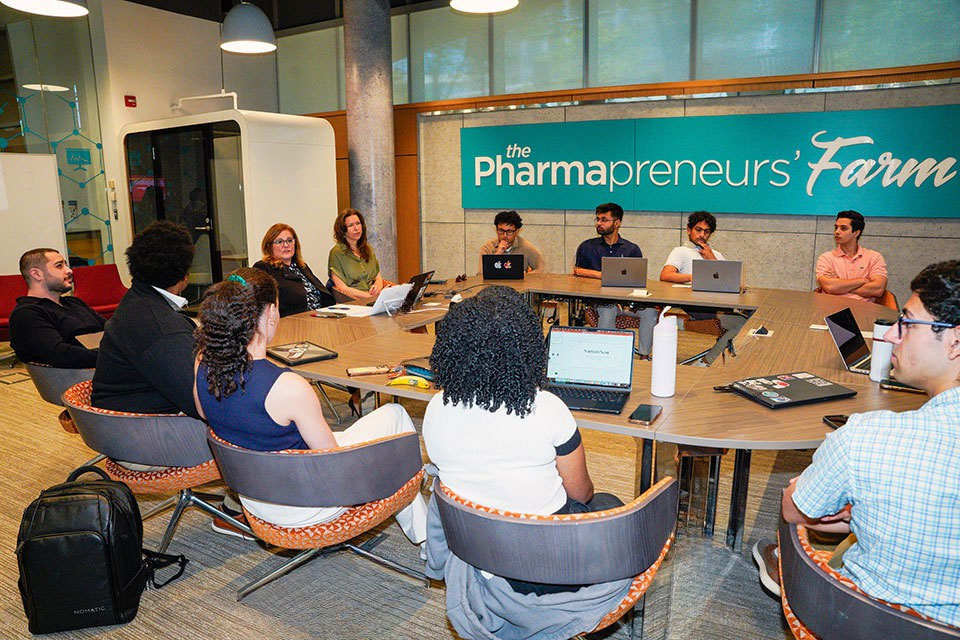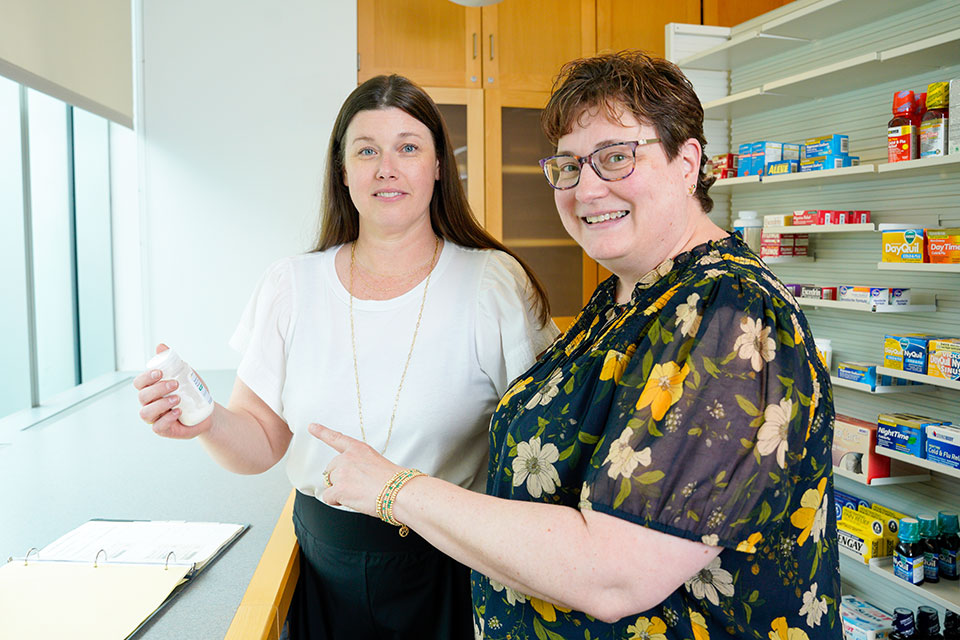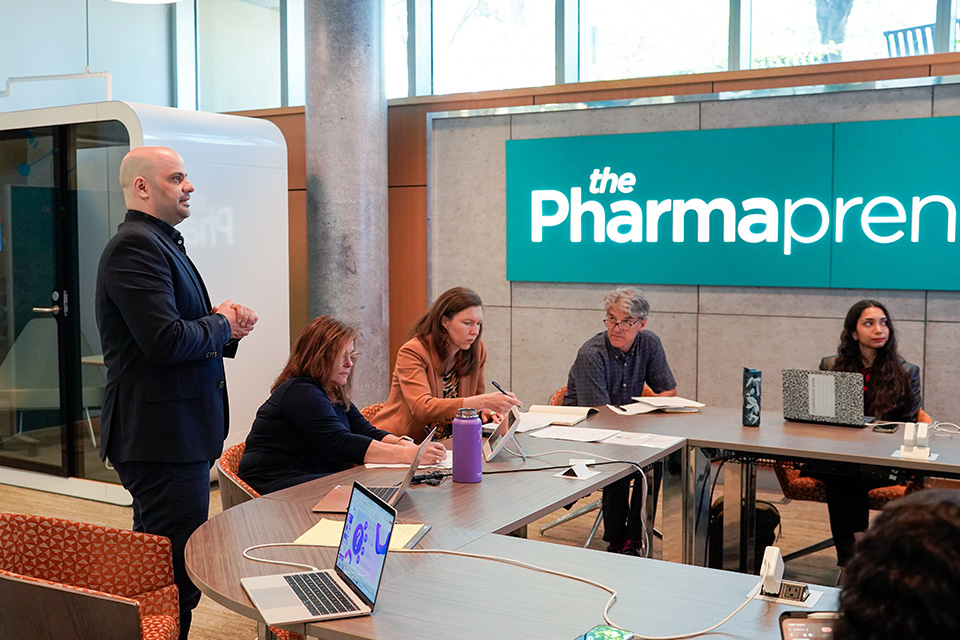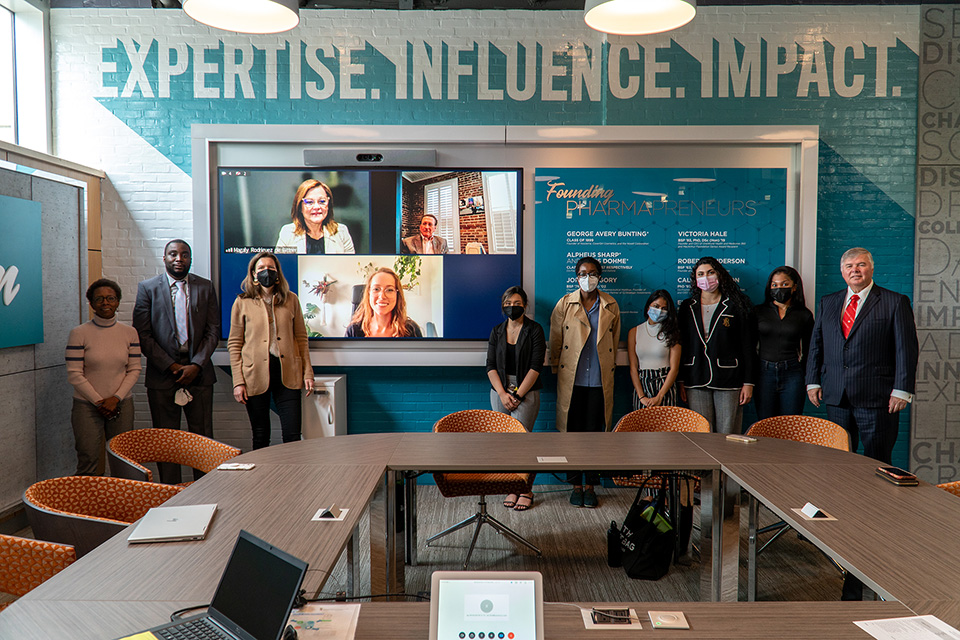Pharmapreneurship® in Action: Pharmacy Students Pitch Innovative Startups at Dolphin Tank
Students present bold health care startup concepts at pharmapreneurship pathway event.

By Pam Carder
May 14, 2025
Future leaders in pharmacy innovation took center stage at the University of Maryland School of Pharmacy (UMSOP) on April 29, when second- and third-year student pharmacists presented entrepreneurial ventures during the annual Dolphin Tank event—an academic take on the popular Shark Tank TV show.
“Pharmapreneurship is about empowering our students to think like innovators and problem-solvers,” said Magaly Rodriguez de Bittner, PharmD, MS, FAPhA, FNAP, professor of practice, sciences, and health outcomes research, associate dean for clinical services and practice transformation, executive director of the Center for Innovative Pharmacy Solutions, and coordinator of the Pharmapreneurship Pathway in UMSOP’s Doctor of Pharmacy curriculum. “This event gives them a platform to take real-world problems and pitch viable, patient-centered solutions.”
Beginning in the fall, Pharmapreneurship Pathway students learn about the process of developing a business idea and bringing it to market. This includes learning about entrepreneurial topics like market research, customer discovery, business planning, finances, patent laws, and application development. The pitching event is the culmination of their pathway coursework
In addition to Rodriguez de Bittner, the Dolphin Tank judges panel included industry figures and mentors:
- Jefferson Gregory, BSP ‘79, JD, Managing partner of Gracetree Investments, LLC
- John Gregory, BSP ‘76, DPS (hon) ‘02, School of Pharmacy Founding Pharmapreneur, board chair and CEO of Gregory Pharmaceutical Holding, Inc., and founder of King Pharmaceuticals
- Kun Yang, PharmD ’15, CEO and co-founder of Pricklee Cactus Water
- Jenny Owens, ScD, MS, vice provost of academic affairs and strategic initiatives at the University of Maryland, Baltimore
During the Dolphin Tank session, each student entrepreneur delivered a pitch and engaged in a dynamic Q&A with the panel. Judges probed the viability of business models, questioned market strategies, and examined potential impact on patient outcomes.
Student Innovators and Their Ideas
The student presentations showcased a range of creativity, clinical insight, and patient-focused innovation.
Vijay Modi, a second-year student pharmacist, presented Medimerge, a telemedicine platform designed to support patients on high-risk medications by streamlining medication therapy management and improving the digital health experience. “Telemedicine is the future, but right now it’s fragmented and risky for patients on complex regimens,” said Modi. “Medimerge is about creating a smarter, safer, and more unified experience for both patients and providers.”
Several presentations explored how emerging technologies can address current gaps in care. One proposal introduced a smart mirror that uses visual and auditory cues to detect early signs of illness, especially for older adults managing chronic conditions. Another focused on expanding educational access with a platform that enables professors to license and share high-quality lectures across pharmacy schools.
A wearable biosensor designed for children with food allergies promised real-time alerts for caregivers, while a social investing concept aimed to connect people with health-driven causes through a crowdfunding-style platform.
Brianna Darbasie, a third-year student pharmacist, focused on fertility health through NurtureNest, a comprehensive platform combining health tracking, supplements, and emotional support for individuals pursuing parenthood. “Trying to conceive is stressful enough without feeling isolated,” she said. “NurtureNest is more than a product—it’s a community that supports women every step of the way.”
Drawing inspiration from a personal family story, Ifeatu Menakaya, a second-year student pharmacist, presented X-Plain RX, a platform for patients with cognitive challenges or limited health literacy. “I created X-Plain RX for patients like my aunt—people who are sometimes left behind by complicated systems,” Menakaya shared. “Everyone deserves to understand their medications and feel confident managing their health.”
Other students tackled public health challenges tied to geography and life stage. One venture offered a full-service home health care model for seniors in Puerto Rico, integrating telehealth, medication delivery, and in-home visits.
Tiffany Batista, a third-year student pharmacist, addressed a gap in postpartum care with MomEase KT, a specialized kinesiology tape designed specifically for new mothers experiencing musculoskeletal pain. Infused with skin-nourishing ingredients, the product offers a non-invasive, accessible solution for physical relief during early parenthood. “Postpartum moms are in pain and overwhelmed,” Batista said. “MomEase KT will be developed to provide them with simple, non-invasive relief that fits into their daily lives easily.”
Universally, the concepts reflected a growing interest in care models that are not only clinically sound but also accessible, personalized, and empowering. Panelists provided real-time feedback and guidance, helping students think beyond the classroom and into the marketplace.
“Each presentation reflected a critical intersection of clinical insight, technology, and entrepreneurial thinking—a hallmark of the pharmapreneurial spirit and mindset this pathway aims to cultivate,” said Rodriguez de Bittner. “We’re not just training pharmacists—we’re developing future leaders who can transform patient care through innovation. We are developing Pharmapreneurs.”
View photos from the event on Flickr.



